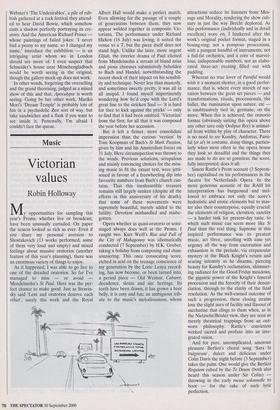Music
Victorian values
Robin Holloway
y opportunities for sampling this year's Proms, whether live or broadcast, have been unusually curtailed. On paper the season looked as rich as ever. Even if you share my personal aversion to Shostakovich (13 works performed, some of them very loud and empty) and mixed feelings about massive oratorios (another feature of this year's planning), there was an enormous variety of things to enjoy.
As it happened, I was able to go live to one of the dreaded oratorios. So far I've managed to miss — or avoid — Mendelssohn's St Paul. Here was the per- fect chance to make good. Just as Stravin- sky said 'Lent and oratorios deserve each other', surely this work and the Royal Albert Hall would make a perfect match. Even allowing for the passage of a couple of generations between them, they now appear welded together in composite Vic- toriana. The performance under Richard Hickox (16 July) was loving; it suited the venue to a T, but the piece itself does not stand high. Unlike the later, more urgent Elijah, the interior drama of Paul elicited from Mendelssohn a stream of bland arias and pious choruses submissively beholden to Bach and Handel, notwithstanding the recent shock of their impact on his sensibil- ity and technique. Never less than masterly, and sometimes sweetly pretty, it was all in all insipid. I found myself impertinently wondering how he'd cope with the Lord's great line to the stricken Saul — 'it is hard for thee to kick against the pricks' — only to find that it had been omitted. 'Victorian' from the first, for all that it was composed the year before her accession.
But it left a firmer, more consolidate impression than the curious 'version' by Tom Koopman of Bach's St Mark Passion, given by him and his Amsterdam forces on 31 July. Here circumspection was thrown to the winds. Previous solutions, scrupulous and mainly convincing choices for the miss- ing music to fit the extant text, were jetti- soned in favour of a freewheeling dip into favourite numbers from Bach's church can- tatas. That this inexhaustible treasure remains still largely sunken (despite all the efforts in this anniversary of his death); that some of these movements were supremely beautiful, merely added to the futility. Devotion mishandled and misbe- gotten.
Opera whether as quasi-oratorio or semi- staged always does well at the Proms. I caught two. Kurt Weill's Rise and Fall of the City of Mahagonny was idiomatically conducted (7 September) by H.K. Gruber, taking a holiday from composing and chan- sonniering. This once coruscating score, etched in acid on the teenage conscience of my generation by the Lotte Lenya record- ing, has now become, or been turned into, a period piece — Old Weimar, Cabaret, decadence, sleaze and sin: heritage. Its teeth have been drawn, it has grown a beer belly, it is cosy and fun; an ambiguous trib- ute to the music's melodiousness, whose attractions seduce its listeners from Mes- sage and Morality, rendering the show culi- nary in just the way Brecht deplored. As this performance (individually and in detail excellent) wore on, I hankered after the work's original pocket format, staged in a boxing-ring; not a pompous proscenium, with a pungent handful of instruments, not a full-fat orchestra, and a core of marvel- lous, indispensable numbers, not an elabo- rated three-act evening filled out with padding.
Whereas no true lover of Parsifal would wish it a moment shorter, in a good perfor- mance, that is, where every stretch of nar- ration between the great set pieces — and transformations, rituals, processionals, the ballet, the rumination upon nature, etc is unobtrusively tied in, germane, on the move. When this is achieved, the oratorio format (obviously suiting this opera above any other save only Oedipus Rex) is animat- ed from within by play of character. There is no need to see Kundry, Amfortas, Parsi- fal (et al) in costume, doing things, particu- larly when most often in the opera house they look so dreadful and the things they are made to do are so gormless; the score, fully interpreted, does it all.
Simon Rattle's Prom account (3 Septem- ber) capitalised on his performances in the theatre for Netherlands Opera. In the more generous acoustic of the RAH his interpretation has burgeoned and mel- lowed to embrace not only the score's hedonistic and erotic elements but to mas- ter also their counterpoise, equally crucial: the elements of religion, elevation, sanctity — a harder task for present-day taste, to which such music can seem more like St Paul than the real thing. Supreme in this inspired performance was its greatest music, act three, unrolling with ease yet urgency all the way from excoriation and exhaustion in the prelude, via crepuscular mystery at the Black Knight's return and searing intensity as he disarms, piercing beauty for Kundry's reclamation, shimmer- ing radiance for the Good Friday meadows, the gigantic power of the Knight's funeral procession and the ferocity of their denun- ciation, through to the clarity of the final resolution. As the well-earned outcome of such a progression, these closing strains lose the slight aura of facility and flavour of saccharine that clings to them when, as in the Nietzsche/Boulez view, they are seen as merely theatrical trappings from an out- worn philosophy. Rattle's conviction worked sacred and profane into an inte- grated vision.
And for pure, uncomplicated, amorous pleasure Berlioz's choral song 'Sara la baigneuse', dulcet and delicious under Cohn Davis the night before (3 September) takes the palm. One would give the Berlioz Requiem cubed by the Te Deum (both also heard this season under Sir Colin) throwing in the early messe solonnelle to boot — for the sake of such lyric perfection.


























































































 Previous page
Previous page